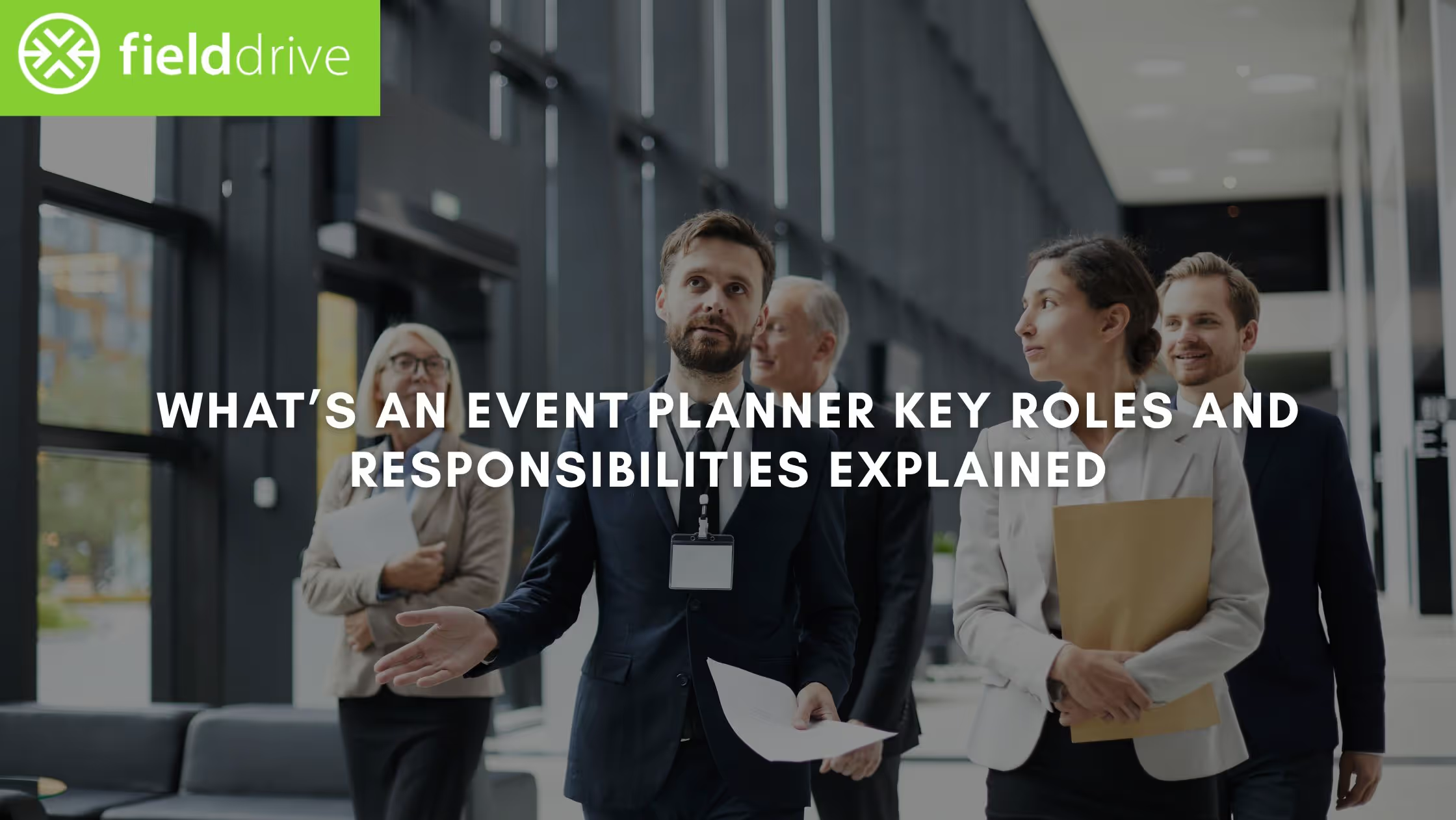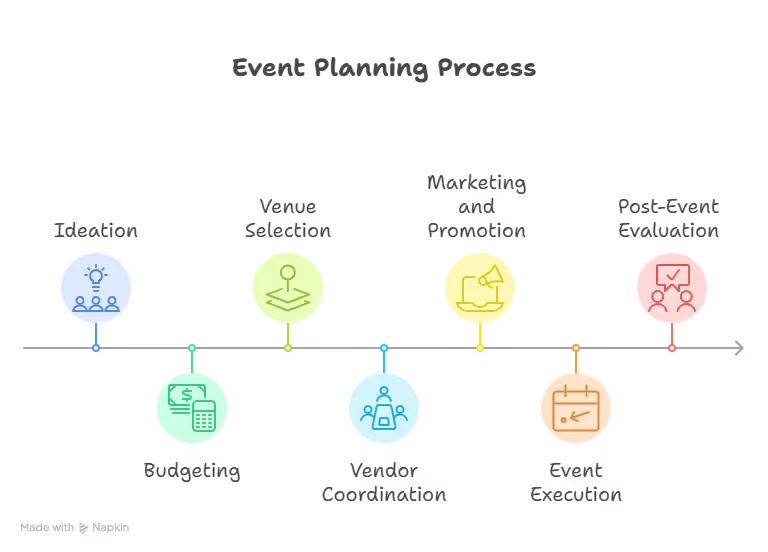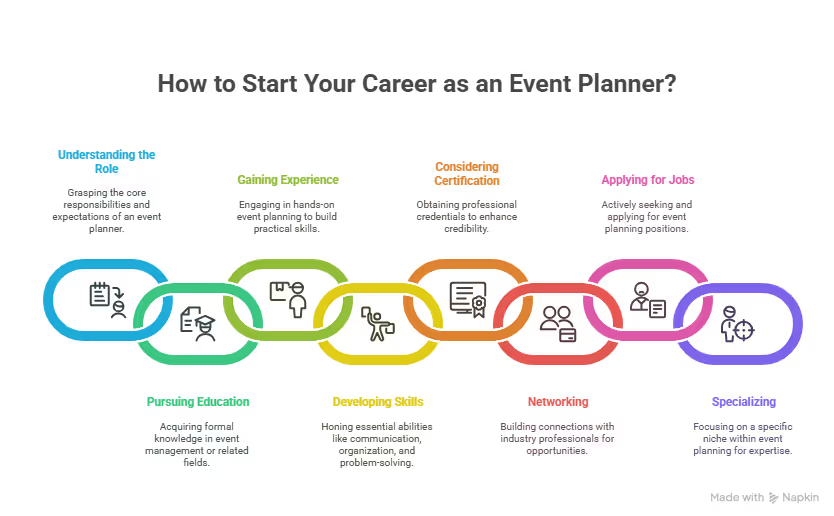What’s an Event Planner: Key Roles and Responsibilities Explained
Wondering what an event planner does? Discover the key roles and responsibilities they handle to create seamless and successful events from start to finish.

CONTENT
Are you wondering what an event planner does and why they’re the key to making any event successful? Event planning is so much more than just setting up a venue or booking a caterer. It’s about turning a vision into a flawless reality.
Whether it’s a corporate event, wedding, or product launch, event planners are the ones who ensure everything runs smoothly, often behind the scenes, making the entire experience memorable.
And with the demand for these experts on the rise, event planning jobs are projected to grow 7% from 2023 to 2033, outpacing many other fields. It's clear that the role of an event planner is more crucial than ever. But what exactly does this job entail?
In this blog, we’ll dive into the key roles an event planner takes on, how they tackle challenges, and why they’re essential to making your next event a success. If you’re planning an event or thinking about becoming an event planner yourself, this is a must-read.
What is Event Planning and What Does It Involve?
Event planning is the art of turning ideas into memorable experiences. From corporate conferences to weddings, it combines creativity with logistics, ensuring that every detail is managed efficiently.
The process is multifaceted, requiring a mix of problem-solving, organizational skills, and the ability to work with various vendors, venues, and clients to create seamless, unforgettable events. Let’s explore the process in more detail:
The Stages of Event Planning
Planning an event involves several key stages that ensure everything runs smoothly from start to finish. These stages provide a clear roadmap to help you stay organized, focused, and on track.

- Ideation: The first step is defining the event's purpose and goals. This sets the foundation for the entire planning process, ensuring all decisions align with the desired outcome.
- Budgeting: Next, allocate funds for various event components like the venue, catering, and marketing. A clear budget helps keep costs in check and resources well-managed.
- Venue Selection: Choose a venue that fits the event’s theme, location, and capacity. Securing the right venue early ensures no last-minute complications and sets the right atmosphere.
- Vendor Coordination: Coordinate with vendors for catering, equipment, and decor. Clear communication and timely execution from vendors are essential to ensure everything runs smoothly.
- Marketing and Promotion: Use targeted marketing strategies like social media and email campaigns to attract attendees. Effective promotion helps ensure the event reaches the right audience.
- Event Execution: On the event day, manage logistics, oversee the setup, and solve any problems as they arise. The goal is to keep everything on track and running smoothly.
- Post-Event Evaluation: After the event, gather feedback to assess success and identify areas for improvement. This helps refine strategies for future events.
Each stage in event planning plays a vital role in delivering a successful event. But to plan that successful event, you’ll need an event planner. Let’s understand who they are.

What is an Event Planner?
An event planner is a professional responsible for organizing and executing events from start to finish, ensuring everything runs smoothly and meets the client’s objectives. Whether it’s a wedding, corporate conference, charity fundraiser, or a product launch, an event planner manages all aspects, ensuring the event aligns with the client's vision.
As an event planner, you’ll work closely with clients to understand their specific goals, requirements, and budget constraints. You combine these elements, turning an idea into a well-executed event that exceeds expectations. But there are various types of events, and they need different types of event planners who specialize in their respective fields. Let’s discuss the types now.
Types of Event Planners
Event planning isn’t a one-size-fits-all profession. Different events require different skills, and therefore, different types of event planners. Whether you’re orchestrating a corporate seminar or a wedding celebration, each event planner brings a unique set of expertise to the table.
Here’s a breakdown of the key types of event planners and the specialized roles they play:
- Wedding Planner: Focuses on organizing and coordinating all aspects of a wedding, from venue selection to catering and décor, ensuring the event runs smoothly and meets the couple's vision.
- Corporate Event Planner: Organizes business-related events like conferences, trade shows, and product launches, aligning the event with the company’s goals and maintaining a professional atmosphere.
- Social Event Planner: Specializes in personal events such as birthdays, anniversaries, and reunions, handling everything from logistics to vendor coordination to create a fun and memorable celebration.
- Non-Profit Event Planner: Organizes fundraising and awareness events for non-profits, managing tight budgets and collaborating with sponsors to make the event impactful and cost-effective.
- Conference/Convention Planner: Manages large-scale events like conferences and conventions, coordinating multiple sessions, speakers, and networking opportunities to ensure a smooth, engaging experience.
- Trade Show/Exhibition Planner: Organizes trade shows and industry exhibitions, managing booth setups, exhibitor registrations, and ensuring a productive environment for showcasing products or services.
- Destination Event Planner: Plans events in unique or remote locations, handling travel arrangements, accommodations, and local vendor coordination to create seamless experiences for attendees.
Each type of event planner is skilled in a specific area and ensures that your event is executed to perfection. To do that, they fulfill some roles and responsibilities. Next, we’ll explore those.
Key Roles and Responsibilities of an Event Planner: What They Do?
An event planner is the backbone of any successful event. From the first consultation to the final follow-up, they handle every detail to ensure everything runs smoothly. Here’s a breakdown of what an event planner does:
- Client Consultation: They begin by understanding your goals, vision, and budget, ensuring everything is aligned for a successful event.
- Concept Development: Once the vision is clear, they help craft the event’s theme, décor, and ambiance, reflecting the client’s objectives and style.
- Budget Management: They manage the event budget, ensuring resources are allocated efficiently across all aspects, such as venue, catering, and entertainment.
- Venue Selection: The planner will research and secure the perfect venue, handling all logistical details such as seating arrangements and layout design.
- Vendor Coordination: From caterers to florists, event planners manage vendor relationships, ensuring that each delivers on time and meets expectations.
- Timeline Creation: They develop a detailed schedule, ensuring all activities, from setup to guest arrivals, are well-coordinated and on track.
- On-Site Event Coordination: On the event day, the planner oversees everything, solves problems, and ensures the smooth running of operations.
- Post-Event Evaluation: After the event, they gather feedback from clients, attendees, and vendors and ensure all tasks are completed, including finalizing payments.
Event planning involves much more than just organizing. You’ll be responsible for everything that ensures the event is seamless, stress-free, and successful. And for that, you’ll need a special set of skills. Let’s discuss what they are.
Essential Skills Every Event Planner Needs
A blend of technical and interpersonal skills is essential for a successful event planner. These skills allow you to manage logistics, engage with clients, and handle an event's details.
Here’s a breakdown of the key hard and soft skills and the educational background or qualifications you might need.
These skills, whether technical or interpersonal, are what make an event planner effective and capable of creating unforgettable experiences. Sounds intriguing? Let’s discover how to pursue that path and become an event planner.
How to Kickstart Your Career as an Event Planner?
Becoming an event planner requires a combination of education, skills, experience, and passion for creating memorable experiences. Here’s a step-by-step guide to help you on your journey to becoming an event planner:

Step 1: Understand the Role
Before diving into event planning, it’s crucial to understand what the job entails. Your role involves everything from logistics to managing budgets, ensuring that everything runs smoothly.
Step 2: Pursue Education in Relevant Fields
While formal education isn't always required, having the right degree will provide a solid foundation. A degree related to event planning or business can help hone essential skills. Here are some options you can consider:
- Bachelor’s in Event Management: Focuses on event logistics, budgeting, and client management.
- Bachelor’s in Hospitality Management: Offers skills related to guest services and event coordination.
- Bachelor’s in Business Administration (BBA): Teaches management and organizational skills necessary for handling large-scale events.
- Bachelor’s in Marketing or Communications: Ideal for focusing on promotional aspects and effective communication.
Step 3: Gain Practical Experience
Practical experience is key. Volunteering or interning with event planning companies allows you to build your portfolio and network with industry professionals.
- Volunteer at local events or assist in planning weddings, conferences, or charity events.
- Take part-time roles or internships with event planning agencies.
- Build your own portfolio by working on small-scale events or family functions.
Step 4: Develop the Right Skills
As an event planner, you'll need a combination of hard and soft skills. Time management, organization, and attention to detail are essential. You’ll also need strong communication skills to interact with clients, vendors, and staff. Learning to remain calm under pressure and solving problems quickly will set you apart from others in the field.
Step 5: Consider Certification
Certifications can set you apart from other candidates and prove your expertise. Many organizations offer certifications that boost your credibility. Here are some certifications you can consider:
- Certified Meeting Professional (CMP): Recognized globally for expertise in organizing meetings and events.
- Certified Special Events Professional (CSEP): Focuses on those specializing in special events like weddings or corporate events.
- Certified Event Planner (CEP): Ideal for planners looking to manage all types of events professionally.
Step 6: Network Within the Industry
Networking is crucial in the event planning industry. Attend industry events, conferences, and meetups to build relationships with other professionals. Join organizations like the Meeting Professionals International (MPI) to stay up-to-date with trends and connect with others in the field.
Step 7: Start Applying for Jobs
Once you have gained relevant experience and developed your skills, start applying for event planning roles. Whether you're working with a company or starting your own event planning business, showcase your portfolio and highlight your event planning skills on your resume.
Step 8: Specialize (Optional)
While general event planning is essential, specializing in a particular niche, such as weddings, corporate events, or non-profit events, can give you an edge in the industry. Specializing allows you to become an expert in that area and attract clients seeking specific expertise.
By following these steps, you’ll be well on your way to building a successful career in event planning. Now you must be wondering how much you can make in this role? What is the growth trajectory this field possesses? Let’s take a look at it.
How Much Does an Event Planner Make: Salary and Growth Outlook
According to recent data, an event planner in the U.S. earns an average annual salary of $62,280. This amount can vary widely depending on factors like location, experience, and the type of events managed. Below we mention some of them:
- Due to the complexity and budget size of these events, those working in high-demand cities or at large-scale corporate events tend to earn higher salaries.
- Planners specializing in corporate events, high-profile weddings, or large trade shows often earn more because these events require greater expertise and larger budgets.
- Geographic location also plays a role, with planners in major cities like New York and San Francisco earning higher wages due to demand and cost of living.
- Experience and a strong reputation in the industry can further increase earning potential, especially for those with certifications like CMP.
Talking about growth, the event planning industry is expecting about 16,500 job openings for event planners each year over the next decade. As businesses and organizations continue to host significant events, the demand for skilled planners will increase.
With a positive outlook and ample job openings, event planning offers a stable and promising career path for those entering or advancing in the field. Also, there are some tips and best practices that will help you advance in your career. Take a look.
Top Tips for Advancing in Your Event Planning Career
Becoming a successful event planner requires constant growth, skill development, and the ability to manage various aspects of event execution. Here's how you can excel in this exciting field.
- Develop Efficient Systems: Establish systems to streamline your workflow. This helps manage multiple tasks simultaneously and ensures smooth execution, especially during hectic events.
- Embrace Flexibility: It is crucial to be able to adjust plans on the fly. Be prepared to find solutions when the unexpected happens, whether it's a vendor delay or last-minute changes.
- Invest in Continuous Learning: The event planning industry evolves constantly. Stay ahead of the game by attending workshops, reading industry blogs, and acquiring certifications that enhance your expertise.
- Hone Your Negotiation Abilities: Whether you’re securing a venue or discussing contracts, strong negotiation skills help you deliver value to your clients while managing the event budget.
- Focus on the Small Details: Small touches can make a big difference in an event's success. From ensuring guest accommodations are met to overseeing event aesthetics, these details create a memorable experience.
Now, the next question comes: What does the typical workplace of an event planner look like? Let’s take a look.

The Event Planner's Workplace: What to Expect
The work environment of an event planner is dynamic and ever-changing, depending on the type of event and the planner’s role. Flexibility and adaptability are key, whether you’re coordinating logistics from an office desk or managing on-site operations at an event.
Here’s a quick look at the different workspaces and environments an event planner experiences:
- Office Environment: Event planners spend time in their office handling administrative tasks, such as client meetings, managing budgets, and coordinating vendors.
- On-Site at Events: A large part of the planner’s role happens at the event venue. Here, planners oversee setup, technical needs, and last-minute changes to ensure everything runs smoothly.
- Client Meetings: Regular meetings with clients are essential to understanding their vision, refining details, and making critical decisions to shape the event.
- Remote Work: Event planners can work remotely using communication tools like email and video conferencing to coordinate logistics, vendors, and clients, offering flexibility.
- Travel Opportunities: For destination events or larger-scale projects, travel may be required for site visits, overseeing event setups, or attending conferences.
- Dynamic and Fast-Paced: Event planning involves tight deadlines, multiple tasks, and constant adjustments. Event planners thrive under pressure while staying organized and focused.
Event planners rely heavily on various tools and technology to stay organized and streamline the event planning process. Let’s explore some essential tools and tech that make event planning smoother, from registration to on-site management.
Tools and Technology Event Planners Use
These tools help event planners stay organized, connected, and efficient, ensuring every event succeeds.
The Next Step: Revolutionize Your Events with fielddrive
As you embark on your event planning journey, selecting the right tools to enhance your events is key. fielddrive simplifies event management, streamlines the check-in process, and elevates the attendee experience. With its innovative features, fielddrive empowers event planners to craft seamless and unforgettable events.
Here are some of its cool features:
- Touchless Check-In: Eliminate long lines with touchless check-in, allowing attendees to register quickly through facial recognition or QR codes, streamlining the event flow.
- On-Demand Badge Printing: Say goodbye to messy name tags. Personalize and print badges on-site in seconds, ensuring a smooth check-in experience.
- Lead Retrieval: Capture valuable attendee information in real-time with an easy-to-use lead retrieval system, helping exhibitors follow up and maximize ROI.
- Session Scanning and Access Control: Effortlessly manage session attendance with real-time data, ensuring only authorized individuals have access to specific sessions.
- Real-Time Analytics: Monitor attendee behavior and session engagement through an intuitive analytics dashboard, enabling data-driven decisions for future events.
- Seamless Integration: Effortlessly sync registration and attendee data with existing event management systems, ensuring everything runs smoothly from start to finish.
With fielddrive, event planners can transform the way they manage events, delivering a smoother, faster, and more engaging experience for everyone involved.
Conclusion
Event planning is a dynamic, multifaceted career that requires creativity, organization, and problem-solving. Whether selecting venues, coordinating vendors, or managing day-of logistics, event planners play a crucial role in turning ideas into unforgettable experiences.
To streamline these tasks and enhance your event's impact, fielddrive offers cutting-edge solutions like touchless check-in, on-demand badge printing, and real-time analytics, helping you deliver flawless events. With fielddrive, you can focus on what matters most, creating extraordinary experiences for your attendees.
Ready to take your event planning to the next level? Book a demo with fielddrive today!
Frequently Asked Questions
Is event planning a good career?
Yes, event planning can be a rewarding career with opportunities for creativity, problem-solving, and networking. It offers a dynamic and fast-paced work environment, and there is a growing demand for skilled planners in various industries.
How do event planners earn?
Event planners earn through fees charged for their services. Their income depends on the event type, scale, location, and their experience. High-demand industries like corporate events and weddings often command higher fees.
What should I study to become an event planner?
A degree in business, marketing, hospitality, or communications is beneficial. Additionally, event planning certifications and hands-on experience through internships or entry-level roles can help you get started.
Want to learn how fielddrive can help you elevate your events?
Book a call with our experts today



.png)
.svg)
.svg)
.svg)

.svg)